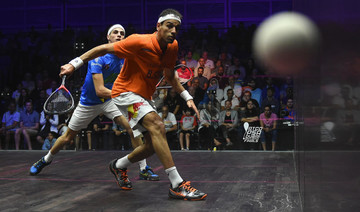The Professional Squash Association (PSA) chief plans to build on the success of staging the first ever professional women’s squash tournament in Saudi Arabia by making a men’s and women’s tournament in the Kingdom a permanent fixture in the squash calendar.
Ziad Al-Turki, the Saudi Squash Federation President and PSA Chairman, collaborated with the General Sports Authority and Princess Reema bint Bandar to stage the landmark event at Princess Nora bint Abdul Rahman University in January, which featured 32 international players.
Eight-time world champion Nicol David hailed the tournament as a historic moment — and Al-Turki revealed plans are underway to make the Kingdom a regular stop on the hectic World Tour.
“It will happen again,” he said. “We are looking at either the end of this year or again in January. Hopefully it will be an annual event and hopefully we can bring back a men’s event. The PSA World Tour is full this year but we are going to find a slot probably for 2019 and then hopefully do a men’s and woman’s tournament back-to-back.”
The Kingdom last hosted a men’s event in 2010 when Nick Matthew won the Men’s World Championship, but Al-Turki now has the appetite to bring back the game’s top male players to Saudi Arabia after seeing the transformative effect the women’s game in January has had.
“Princess Noura University and King Saud University are contacting us telling us they want us to bring in trainers so they can host an amateur tournament between each other,” said Al-Turki. “We are getting contacted by girls who want to start participating in squash — that’s the ultimate goal. In that sense, it was a great success.”
Al-Turki said he will learn the lessons of the January tournament when staging future events.
“It took a lot of administrative work to get it approved – it didn’t happen overnight,” he said. “I started this when Prince Abdullah was at the helm and then it got another push when Princess Reema was first appointed. It was a few years in the making.
“We were under certain constraints and we couldn’t go out and advertise it as much to try and get more spectators. I would have loved for it to be at one of the women’s universities as it would have drawn a bigger attendance.”
Al-Turki does not just want to make the Kingdom a money-spinning opportunity for the world’s top players. He wants to stimulate the growth of the game in Saudi Arabia and give local players the chance to climb up the world rankings — and not just have to rely on wildcard entries.
“We are not just looking at big events — we are looking at doing smaller events to give the guys a chance to participate and get some points,” he said.
“Nada Abu Alnaja, for example, has become a professional player because she had to get a wildcard (for entry to the Saudi Women’s Masters). We are looking to build on the grassroots and bringing in top players for tournaments gives the grassroots a push.”
That will be music to the ears for the likes of rookies Mohammad Almwled, Abdulmajeed Boureggah and Abdulelah Boureggah. Their inexperience of playing competitive squash was exposed when they represented Saudi Arabia at the World Team Squash Championship in India in July. It was the first time a team from the Arab state had competed in the event and they finished last. Al-Turki is seeing signs of a revival of the game in the Kingdom and is excited about two young prospects.
“We did have quite a few young, aspiring players back in 2008-2009 but it fizzled out a bit,” he said. “Now it’s picking up again. We have two juniors who I am sponsoring and sending to international tournaments, they are 11 and 12. We had a third place finish at a junior tournament in Europe, so we’ve got high hopes for them. They are competing in the Kingdom and in GCC tournaments. The grandfather of squash in Saudi Arabia (Samer Al-Khateeb) has kind of adopted them and I pay their expenses. They are very eager, so the future could be bright with those two.”
Saudi Arabian squash supremo expects sport to grow in the Kingdom
Saudi Arabian squash supremo expects sport to grow in the Kingdom

- Ziad Al-Turki, the Saudi Squash Federation President and PSA Chairman, wants more squash in the Kingdom
- He wants to stimulate the growth of the game in Saudi Arabia and give local players the chance to climb up the world rankings












